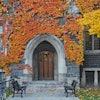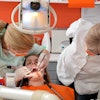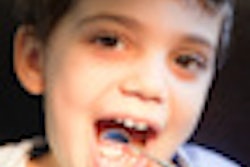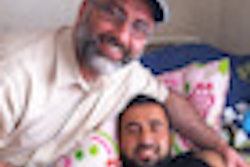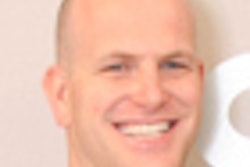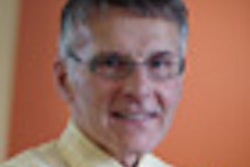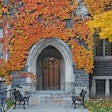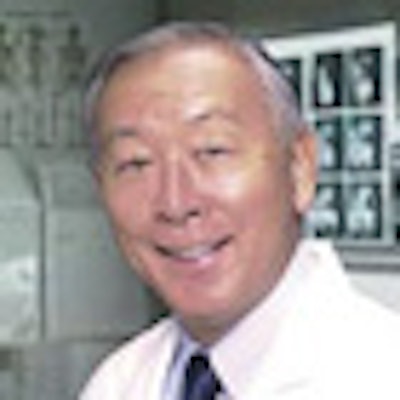
For California dentist Terry Tanaka, DDS, the quest to establish a clinic in Mexico to treat poor children with cleft palates began with a 5-year-old boy who was brought by his mother to a Mexicali clinic in 1977.
"He put up such a fuss that I didn't think I would be able to make an impression that day," Dr. Tanaka recalled. The boy was born with a cleft of his hard and soft palate.
But after Dr. Tanaka gave the young patient half of his sandwich, the boy's demeanor completely changed. "He reached into his pocket and pulled out a piece of a half-eaten cookie with lint all over it and gave it to me, along with a big hug," he said. "To this day, I have the memory of that cookie to remind me of why I go on these trips to Mexico."
 Terry Tanaka, DDS, was honored with the 2011 CDA Foundation Humanitarian Award for his decades of work treating thousands of Mexican children with cleft palate and related conditions.
Terry Tanaka, DDS, was honored with the 2011 CDA Foundation Humanitarian Award for his decades of work treating thousands of Mexican children with cleft palate and related conditions.
Over the last 30 years, thousands of children have been treated by the dental and surgical teams Dr. Tanaka has organized.
Dr. Tanaka is a clinical professor of prosthodontics at the University of Southern California School of Dentistry in Los Angeles and maintains a practice specializing in prosthodontics in Chula Vista, CA. He also does research regarding occlusion, anatomy and implant surgery, and many dental schools use his DVDs for implant surgery training.
In addition, Dr. Tanaka runs the nonprofit Clinical Research Foundation, which is dedicated to funding research and charitable endeavors. Dr. Tanaka and his Rotarian group also established one of the largest comprehensive dental and surgical teams in Mexico.
The California Dental Association (CDA) recently honored Dr. Tanaka with the 2011 CDA Foundation Humanitarian Award in recognition of his work treating children with maxillofacial deformities.
"Dr. Tanaka serves as an inspiration to dentistry and exemplifies a selfless dedication to our profession," said Donald Rollofson, DMD, chair of the CDA Foundation.
Long-term goals
Early on, Dr. Tanaka raised money from barbeques, golf tournaments, and a grant from the Rotary Foundation. For years, his dental team operated as a "MASH" unit in a Red Cross clinic in Ensenada before the team raised enough money to buy a building there. It is now a fully equipped clinic with eight dental chairs.
“This is what dentistry and being a doctor is all about.”
— Terry Tanaka, DDS
His goal is to provide free long-term dental and surgical care for poor children in Mexico and Central America with craniofacial deformities.
"This is what dentistry and being a doctor are all about," he told DrBicuspid.com.
What makes the project unique is that it is one of the only comprehensive dental and surgical teams from the U.S. that includes about 150 volunteers who provide a range of care, ranging from surgical, restorative, prosthetic, and orthodontic treatment, as well as speech therapy and hearing testing and ENT surgery.
The dental teams pay for all of their own travel and hotel expenses in Mexico, Dr. Tanaka noted.
The restorative program also includes placing sealants and endodontic treatment, as well as providing follow-up care to the children who had surgeries. The surgery teams perform operations to close clefts of the lips and palates, realign dental arches, and place bone grafts. In addition, the team treats children with other genetic disorders such as hemicraniofacial microsomia and Crouzon and Treacher-Collins syndromes.
Complex cases
Most of the children have deformities of the ear and temporomandibular joint, and many have malformed ear structures that make them susceptible to ear infections and hearing disorders.
"Our team probably sees the most complex cases," said Dr. Tanaka, who worked with the late Soona Jahina, DDS, who was the orthodontic craniofacial expert for more than 30 years. She and her colleagues provided the prosthodontic and lab support for the team and made maxillofacial appliances that help spread and realign the children's jaws.
About 10% of the children with cleft problems are born without an ear. For these children, oral and maxillo-facial surgeons from the University of California, Los Angeles, (UCLA) place dental implants in the surrounding bone, using the same dental clips (implant attachments) that are used for dental partials. The UCLA team also make the artificial ears for the patients. "The process is quite amazing," Dr. Tanaka said.
The team includes oral surgeons trained in Mexico who operate and also provide follow-up support for any complications that may occur after our surgeons return to the U.S.
Occasionally, children are seen with no functioning condyle in the fossa (jaw joint), and therefore suffer from facial deformities that can only be corrected with costochondral rib grafts and other creative surgical procedures, Dr. Tanaka noted. Some of these patients are brought back to San Diego or Los Angeles for surgery.
For many years, the dental team included seven dentists from Dr. Tanaka's family. His daughter, Katherine Tanaka Mits, DDS, led the dental team for over 15 years and runs his California office. His son, Randall Tanaka, DDS, has a general practice in El Cajon, CA.
Political challenges
For dentists who want to help the needy, Dr. Tanaka explains that treating the underserved children in the U.S. provides fewer challenges than dealing with foreign government bureaucracies. He noted that it is important to know that any dentist who treats patients in Mexico requires an active state license in the U.S. and a permit to treat Mexican patients issued by the Mexican state. If an untoward accident occurs, such as an injury to a patient, the individual can be jailed in Mexico, and he stressed the importance of getting the proper permits before treating patients there.
"Charity begins at home, even though foreign projects sound very exciting," Dr. Tanaka said. "There's a large need here, even in California."
In addition, crime among the drug cartels along Mexican border cities have increased with kidnappings and robberies of tourists and even a dentist and his son. Dr. Tanaka and his family have stopped making the trips to Mexico, but continue to provide financial support to other mission teams in Central and South America and Thailand. "I believe that it not safe for volunteers to go down there at this time. Perhaps at some later date when it is more safe," he said.
Several Mexican patients even come to his office in California accompanied by bodyguards, Dr. Tanaka noted.
Some field mission team members still make the trek to Mexico to treat the children in spite of the current dangers, he said.
Memories of the grateful mothers and their children who have traveled for several days by bus to the clinic give Dr. Tanaka hope that someday peace and order will be restored so that other Field Mission Teams will return to fill the need in these countries.
"What is really heart warming is the fact that the mothers and grandmothers who bring the children do not see the deformity; they only see the beautiful child and hope that their child will be made whole like other children."
